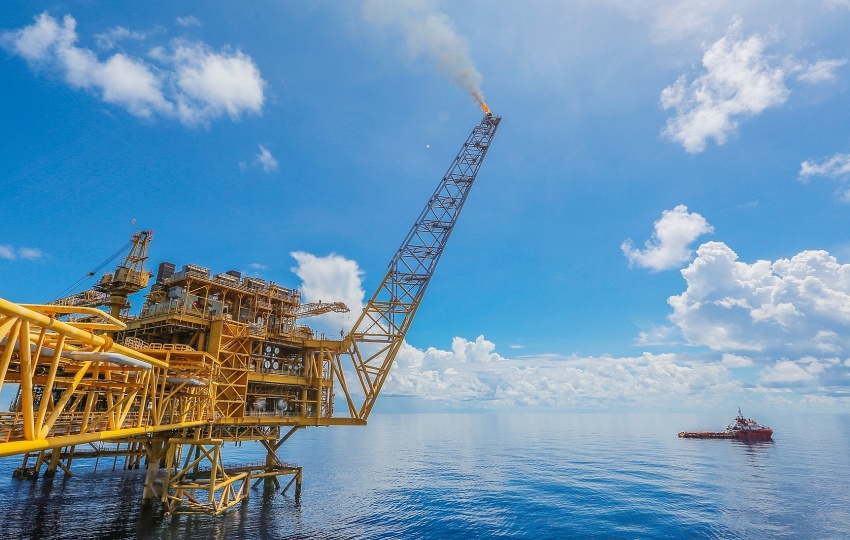Vietnam's oil and gas laws in urgent need of readjustment to current-day realities
According to Resolution No.55-NQ/TW dated February 11, 2020 of the Politburo on strategic orientations for Vietnam's National Energy Development to 2030 with a vision to 2045, the energy sector still has many limitations.
“A number of mechanisms and policies are not suitable with market mechanisms and have not promoted the establishment of a competitive energy market. Policies on investment, development, and the management of energy resources are still lacking and inconsistent,” reads the Resolution.
As a result, in 2016-2020, even though many partners had come looking for an investment opportunity, PetroVietnam only signed eight new oil and gas contracts, only one of which was with a foreign partner, Murphy Oil Corporation from the US.
 |
| Gas and condensate exploitation in Nam Con Son basin |
With the current regulations, too many agencies are involved in policymaking and the approval of related processes, from the prime minister, state management agencies in charge of the field, ministries and ministry-level agencies, and PetroVietnam to the people's committees of provinces and centrally-run cities.
Meanwhile, the current legal framework remains inadequate, the terms of oil and gas contracts are not as attractive as those in other regional countries. These are hampering foreign investors in the exploration and exploitation of oil and gas reserves.
Experts believe that it is necessary to complete the legal framework on the oil and gas industry to promote exploitation and exploration activities and increase production in deep-water and offshore areas.
The Law on Petroleum (LoP) needs to be adjusted to apply to all oil and gas activities, and the government should set it as the overriding legal document in case of inconsistency or overlapping with other laws to minimise problems.
According to Doan Van Thuan, an expert from the Centre for Economic Research and Petroleum Management under the Vietnam Oil and Gas Institute (VPI), competent authorities should consider adjusting the competence of approval of state management agencies in the revised LoP.
Accordingly, the prime minister should only approve processes that influence the "state’s ownership of oil and gas resources" such as approving petroleum contracts, transferring the right to participate in oil and gas contracts, and terminating contracts.
To increase proactivity in the implementation process and align with international oil and gas practices, the PM should consider empowering the Ministry of Industry and Trade or PetroVietnam to approve junior documents, such as the list of oil and gas blocks, bidding plans, bidding results, switching work commitments, extending the scope of contracts, and reporting oil and gas reserves, Thuan added.
 |
| Ken Bau 2X well, block 114, Song Hong basin |
As oil and gas exploitation and exploration is a high-risk business that is mainly carried out in offshore deep water areas with high cost and difficult construction conditions, the VPI has proposed competent authorities to diversify the forms of oil and gas contracts (apart from the current Production Sharing Contracts) and increase incentive mechanisms to attract investment.
“Mechanisms and policies in accordance with international practices, ensuring the harmonisation of interests of both investors and host countries in the new conditions need to be urgently considered, studied, and applied,” the PVI said.
Dr. Ngo Thuong San, chairman of the Vietnam Petroleum Association, said that the LoP and related legal documents need to be revised to suit the current realities and Vietnam’s oil and gas potential, encourage foreign investment, utilise declining fields, improving the oil recovery coefficient, as well as invest in marginal fields, deep-water and offshore areas.
What the stars mean:
★ Poor ★ ★ Promising ★★★ Good ★★★★ Very good ★★★★★ Exceptional
Related Contents
Latest News
More News
- MAE names big 10 policy wins in 2025 (February 06, 2026 | 08:00)
- US firms deepen energy engagement with Vietnam (February 05, 2026 | 17:23)
- Vietnam records solid FDI performance in January (February 05, 2026 | 17:11)
- Site clearance work launched for Dung Quat refinery upgrade (February 04, 2026 | 18:06)
- Masan High-Tech Materials reports profit: a view from Nui Phao mine (February 04, 2026 | 16:13)
- Hermes joins Long Thanh cargo terminal development (February 04, 2026 | 15:59)
- SCG enhances production and distribution in Vietnam (February 04, 2026 | 08:00)
- UNIVACCO strengthens Asia expansion with Vietnam facility (February 03, 2026 | 08:00)
- Cai Mep Ha Port project wins approval with $1.95bn investment (February 02, 2026 | 16:17)
- Repositioning Vietnam in Asia’s manufacturing race (February 02, 2026 | 16:00)

 Tag:
Tag:























 Mobile Version
Mobile Version